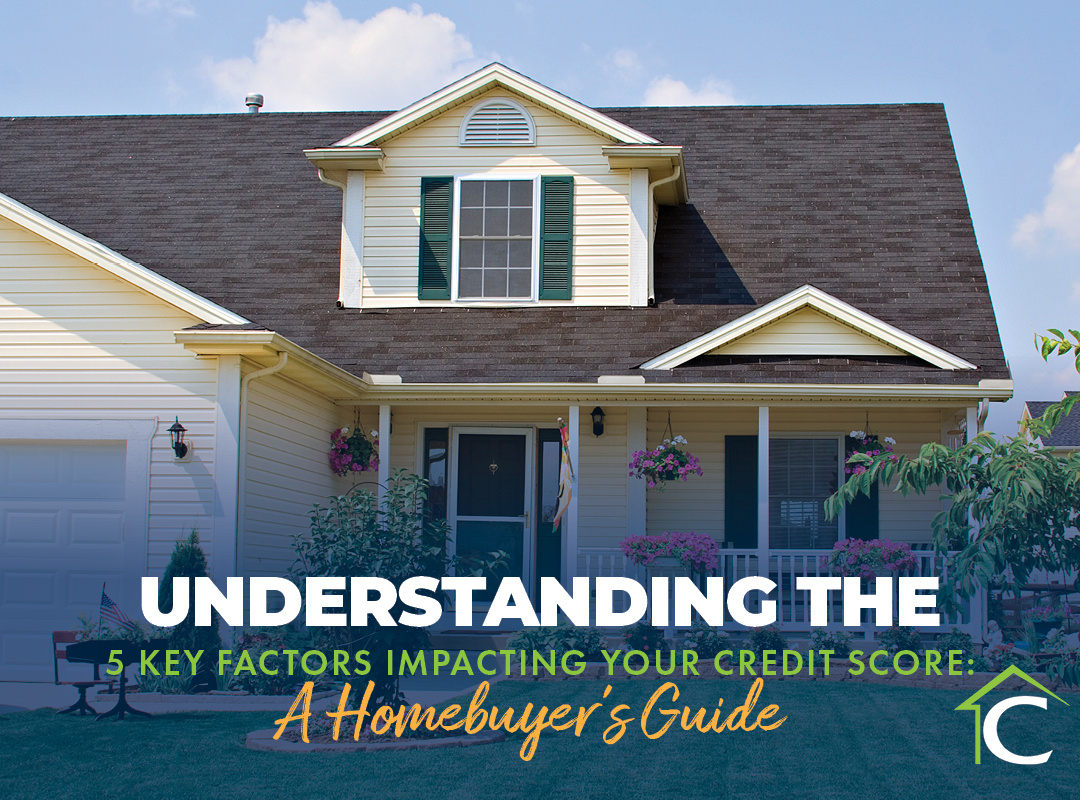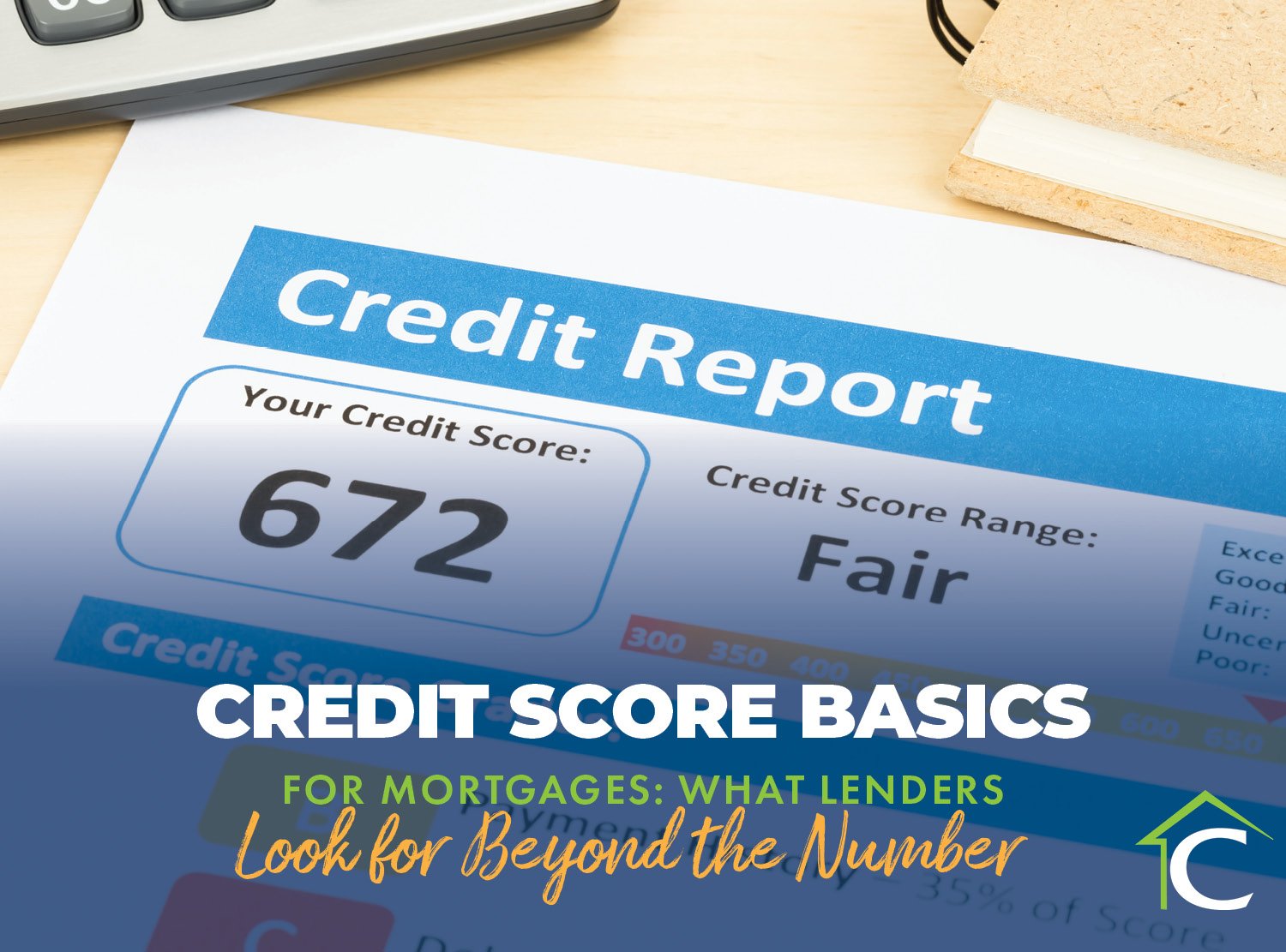What credit score do you need to buy a house—and how much will it really cost you if it's not high enough?
For many homebuyers, mortgage approval doesn't fall apart because of income or savings—it fails because the credit score is just a few points short. And that gap can mean higher rates, stricter terms, or losing the home altogether.
Your credit score—most often a FICO score—is one of the most powerful levers in the mortgage process. It determines whether you qualify, which loan programs you're eligible for, and how much interest you'll pay over the next 30 years. Yet most buyers don't know what actually drives their score—or how to improve it before applying.
This guide breaks down the five FICO credit score factors, explains minimum credit score requirements for FHA, conventional, VA, and USDA loans, and shows what actually works to raise your score in 30–90 days (and what doesn't).
If you're planning to buy a home within the next year, this knowledge can save you tens of thousands of dollars. And if you want clarity on where you stand right now, start with a free pre-aproval—at Contour Mortgage, we've helped homebuyers navigate this exact situation for more than 30 years.
Key Takeaways
- Payment history matters most: Your track record of on-time payments accounts for 35% of your credit score—more than any other factor.
- Credit utilization is crucial: Keeping balances below 30% of your credit limits (ideally under 10%) makes up 30% of your score.
- Different loans have different minimums: FHA loans may accept scores as low as 580, while conventional loans typically require 620 or higher.
- Your score affects your rate: Even a 20-point difference can cost or save you tens of thousands of dollars during a 30-year mortgage.
- Improvement takes time: Strategic credit management can raise your score 50-100 points in six to 12 months with consistent effort.
- Free monitoring is available: You can check your credit reports from all three bureaus at no cost through AnnualCreditReport.com.
What Is a Credit Score & Why Do Mortgage Lenders Care?
A credit score is a three-digit number, typically ranging from 300 to 850, that represents your creditworthiness to lenders. The most widely used scores in mortgage lending are FICO scores, created by the Fair Isaac Corporation. According to the Consumer Financial Protection Bureau, these scores help lenders predict how likely you are to repay borrowed money.
Mortgage lenders rely on your credit score to assess risk—specifically, how likely you are to repay a loan on time. A higher score signals to lenders that you're a responsible borrower, which often translates to better loan terms and lower interest rates. Unlike credit cards or auto loans, mortgages involve hundreds of thousands of dollars throughout 15-30 years, which is why lenders scrutinize credit scores carefully.
The minimum credit score to buy a house varies by loan type, ranging from 500 for FHA loans (with conditions) to 640 for USDA loans. However, meeting the minimum doesn't guarantee approval—your entire financial profile matters.
5 Factors That Determine Your Credit Score
According to myFICO.com, the consumer division of FICO, five main factors contribute to your credit score. Each carries a different weight, and understanding this breakdown helps you focus your improvement efforts where they'll have the biggest impact.
1. Payment history (35% of your credit score)
This is the single most important factor in your credit score, accounting for 35% of the total. Payment history tracks whether you've paid your past credit accounts on time—and lenders consider it the strongest predictor of future payment behavior.
What's included:
- Credit card payments
- Retail account payments
- Installment loan payments (car loans, student loans, personal loans)
- Mortgage payments
- Public records (bankruptcies, foreclosures, liens, collections)
What matters most: Even one 30-day late payment can drop your score by 60-110 points, depending on your overall credit profile. The impact diminishes over time, but late payments remain on your report for seven years.
For homebuyers: Mortgage lenders pay especially close attention to your payment history throughout the past 12-24 months. If you're planning to apply for a mortgage within the next year, make on-time payments your absolute priority. Avoid common first-time homebuyer mistakes like missing bills during the application process—set up autopay if you haven't already.
2. Amounts owed (30% of your credit score)
The second-most important factor is the amounts you owe, comprising 30% of your credit score. This primarily refers to your credit utilization ratio—the percentage of available credit you're currently using.
What's included:
- Credit card balances relative to credit limits
- Installment loan balances
- Total debt across all accounts
The 30% rule: Credit experts recommend keeping your utilization below 30% of your total available credit. For example, if you have $10,000 in total credit limits across all cards, try to keep your combined balances under $3,000. For the best scores, aim for under 10%.
Here's what that looks like in practice:
- Good: $2,000 balance on a $10,000 credit limit = 20% utilization
- Concerning: $8,000 balance on a $10,000 credit limit = 80% utilization
For homebuyers: High credit utilization might signal financial stress to lenders. If possible, pay down credit card balances before applying for a mortgage, even if you need to tap savings temporarily. The score improvement can happen within one to two billing cycles, making this one of the fastest ways to boost your credit score.
3. Length of credit history (15% of your credit score)
Your credit history length accounts for 15% of your credit score and considers how long you've been using credit—specifically the age of your oldest account, newest account, and average age of all accounts.
For homebuyers: A longer credit history provides more data for lenders to assess your creditworthiness. If you're a first-time buyer with limited history, you can still qualify with as little as 12 months of credit history on an FHA loan.
Important tip: Avoid closing old credit cards, even if you rarely use them, as this can shorten your average credit history and potentially hurt your score.
4. Credit mix (10% of your credit score)
Your credit mix, or variety of credit types, comprises 10% of your credit score. This includes credit cards, retail accounts, installment loans, and mortgages. A diverse mix demonstrates your ability to manage various financial obligations, but don't open new accounts just to improve this factor—it's the smallest component of your score.
5. New credit (10% of your credit score)
The final 10% of your credit score is determined by your new credit activity, including recently opened accounts and credit inquiries.
What's included:
- Number of recently opened accounts
- Number of recent credit inquiries (when lenders check your credit)
- Time since your most recent accounts were opened
Hard inquiries vs. soft inquiries: When you apply for credit, lenders perform a "hard inquiry" that can temporarily lower your score by 5-10 points. FICO typically treats multiple mortgage inquiries within a shopping window (up to 45 days, depending on the scoring model) as a single inquiry. "Soft inquiries"—like checking your own credit—don't affect your score.
Critical for homebuyers: Avoid opening new credit cards or taking on new loans three to six months before applying for a mortgage. Lenders will see new accounts as additional financial obligations, and the temporary score dip from hard inquiries could affect your loan terms.
What Credit Score Do You Need for a Mortgage? Requirements by Loan Type
The minimum credit score to buy a house ranges from 500 to 640, depending on your loan type. Here's a breakdown of credit score requirements for the most common mortgage programs:
|
Loan Type |
Minimum Credit Score |
Best Rates Score |
Notes |
|
Conventional Loans |
620 |
740+ |
Backed by Fannie Mae and Freddie Mac |
|
FHA Loans |
580 (3.5% down), 500 (10% down) |
680+ |
Insured by Federal Housing Administration; most popular for first-time buyers |
|
VA Loans |
No official minimum* |
660+ |
Guaranteed by Department of Veterans Affairs; available to qualifying veterans |
|
USDA Loans |
640 |
680+ |
For eligible rural/suburban properties |
*While the VA doesn't set a minimum credit score, individual lenders establish their own requirements (typically 620+).
Important context: These are minimum scores for approval consideration, but many lenders add "overlays"—additional requirements beyond government minimums. For example, while FHA technically accepts 580, many lenders won't go below 620 in practice. Meeting the minimum doesn't guarantee approval—lenders evaluate your entire financial profile, including income, debt-to-income ratio, employment history, and savings.
Ready to see which loan type fits your situation? Learn more about FHA loan requirements or explore VA loan benefits for qualified veterans.
How Your Credit Score Impacts Your Mortgage Rate (& What It Costs You)
Your credit score doesn't just affect whether you get approved for a mortgage—it significantly influences the interest rate you're offered. The credit score needed for the best mortgage rates is typically 740 or higher, but even small improvements below that threshold can save you thousands.
Here's an example to illustrate the impact:
On a $400,000, 30-year fixed-rate mortgage:
- 680 credit score might qualify for a 7.2% rate = $2,661/month
- 740 credit score could qualify for 6.8% rate = $2,588/month
That 0.4% rate difference can save you around $70 per month and roughly $25,000 in interest over 30 years. This is why improving your credit score before applying—even by 20-40 points—can be one of the most valuable financial moves you make as a homebuyer.
How to Improve Your Credit Score Fast: Realistic Timelines
One of the most common questions we hear is "How long does it take to improve your credit score?" The answer depends on your starting point and which factors you're addressing. Here's a realistic timeline for common scenarios:
|
Starting Situation |
Improvement Strategy |
Realistic Timeline |
Expected Gain |
|
High credit card balances |
Pay down to under 30% utilization |
1-2 billing cycles |
30-50 points |
|
Recent late payment |
Establish on-time payment pattern |
6-12 months |
20-80 points |
|
No credit history |
Open secured card, become authorized user |
6-12 months |
Establishes scoreable credit |
|
Collection accounts |
Pay/negotiate settlements |
3-6 months after payment |
10-40 points |
Key insight: The most impactful short-term action is reducing credit utilization. Since this factor updates monthly as your balances are reported, you can see improvement within 30-60 days of paying down balances—making it the fastest way to boost your credit score.
For comprehensive improvement—especially recovering from late payments or collections—expect six to 12 months of consistent positive behavior to raise your score by 50-100 points. Once you've improved your score, the next step is getting pre-approved for a mortgage, which locks in your rate while you house hunt.
Common Credit Score Myths for Homebuyers
Myth 1: Checking your own credit score hurts it.
False. When you check your own credit (a "soft inquiry"), it has zero impact on your score. Only "hard inquiries" from lenders when you apply for credit affect your score, and even these typically lower it by just 5-10 points temporarily.
Myth 2: Closing old credit cards improves your score.
False. Closing old accounts can actually hurt your score by reducing your available credit (increasing utilization) and shortening your credit history length. Keep old cards open, even if you rarely use them.
Myth 3: You need perfect credit to buy a house.
False. While excellent credit helps, you can qualify for an FHA loan with a credit score as low as 580, or even 500 with a larger down payment. The key is understanding which loan programs match your situation.
Myth 4: Paying off collections immediately removes them.
False. Paid collections remain on your credit report for seven years from the original delinquency date. However, paying them can improve your approval odds and may provide a small score boost with newer FICO models.
Frequently Asked Questions About Credit Scores for Homebuyers
What credit score do I need to buy a house?
The minimum credit score to buy a house is 580 for FHA loans (or 500 with 10% down), 620 for conventional loans, 620 for most VA lenders (though VA has no official minimum), and 640 for USDA loans. However, higher scores qualify you for better rates—aim for 680+ for competitive conventional loan terms and 740+ for the best rates available. Self-employed borrowers may need higher scores (typically 660+) even for FHA loans, and investment properties usually require 680+ regardless of loan type.
How fast can I improve my credit score before applying for a mortgage?
If your main issue is high credit card utilization, you can see improvement within one to two billing cycles (30-60 days) after paying down balances below 30% of your limits. For recovering from late payments or building credit history from scratch, plan for six to 12 months of consistent positive behavior. If you're serious about buying within the next year, start working on your credit now—the improvements compound over time.
Does checking my own credit score hurt it?
No. When you check your own credit (called a "soft inquiry"), it has zero impact on your score. You should regularly monitor your credit reports and scores through services like AnnualCreditReport.com. What does affect your score are "hard inquiries" from lenders when you apply for credit—but even these typically lower your score by only 5-10 points temporarily. Multiple mortgage rate-shopping inquiries within a 45-day window count as a single inquiry, so shop around freely during that period.
Can I get a mortgage with collections or charge-offs on my credit?
Possibly, depending on the type of loan and the circumstances. FHA loans are often more flexible with past credit issues, especially if you can document that the issues are resolved or resulted from circumstances beyond your control (medical bills, for example). Recent collections have more impact than older ones. Many lenders require that collections be paid or have a payment plan in place before closing. This is a situation where working with an experienced loan officer is crucial—they can guide you through specific FHA requirements and options.
How to Check Your Credit Score for Free
Regularly reviewing your credit reports keeps you informed about your credit status and helps you identify potential errors or signs of identity theft. The Federal Trade Commission provides information on how to obtain free credit reports from the three major credit bureaus (Equifax, Experian, and TransUnion) through AnnualCreditReport.com—the only authorized site for truly free reports.
Smart monitoring strategy: Request one report every four months, rotating between bureaus. This gives you three checkpoints throughout the year. When reviewing, look for accounts you don't recognize, incorrect payment histories, duplicate accounts, or outdated negative information (most items must be removed after seven years). If you find errors, dispute them with the credit bureau—they must investigate within 30 days.
Taking the Next Step Toward Homeownership
Understanding the factors influencing your credit score puts you in control of one of the most important elements of mortgage approval. Whether you're starting with excellent credit or working to improve a challenging situation, the knowledge in this guide gives you a roadmap.
Remember that improving your credit score is a gradual process requiring consistent financial habits over time. Start where you are, focus on the highest-impact factors (payment history and credit utilization), and give yourself enough runway—ideally six to 12 months—before you plan to apply for a mortgage.
Ready to understand where you stand? Reach out to a Contour mortgage expert today to assess your financial readiness. Our experienced loan officers will evaluate your current credit profile, explain how it affects your mortgage options, and provide a personalized action plan to strengthen your application. Whether you're exploring conventional loans, FHA financing, or VA benefits, we'll help you find the right path. There's no obligation—just clear guidance on your path to homeownership.
Contour Mortgage has been helping homebuyers navigate the mortgage process and achieve homeownership for more than three decades. With nearly 500 mortgage professionals nationwide, we combine the resources of a large lender with personalized, local service. Our commitment to integrity, character, and honesty guides everything we do.

















